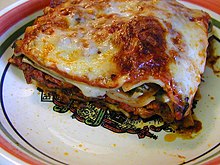Lasagna

Lasagna (singular, Italian pronunciation: [laˈzaɲɲa]; plural lasagne [laˈzaɲɲe] but always spelled lasagne in Italy and UK) is both a form of pasta in sheets (sometimes rippled, though seldom so in Northern Italy) and a key component of the dish lasagne al forno (meaning "oven-cooked lasagne") made with alternate layers of pasta, cheese, and often ragù.
The word lasagna, which originally applied to a cooking pot, [citation needed] now simply describes the food itself.
Variants
Some recipes call for more than one cheese, most often ricotta and mozzarella. Mozzarella is made in the south of Italy, so the use of these two cheeses is typical of lasagne made in Naples or further south.

Lasagne alla Bolognese uses only Parmigiano Reggiano, Bolognese sauce and nutmeg flavored béchamel sauce (besciamella). Classic Bologna lasagne should be made with Lasagne verdi (green lasagne) which is egg pasta with added spinach, although in other towns of Emilia-Romagna, the lasagne need not be green. As with the term 'lasagne', the verdi variety can refer to the dish or the pasta. A vegetarian version of the traditional Bologna lasagne or “Lasagne alla bolognese" is sometimes found in adjacent in Tuscany – not traditionally a pasta region – and other regions. It substitutes a simple tomato and basil sauce for the Bolognese sauce, arranged with layers of noodles, nutmeg flavored béchamel sauce and Parmigiano-Reggiano cheese.
Especially outside Italy, there are many variants, from artichoke spinach lasagna to spicy chipotle lasagna to vegetarian, seafood and tarragon versions. The dish lends itself to creative use of ingredients by home cooks as well as chefs.
Today the term "Lasagne" is often chef speak for layering and baking, [citation needed] so you may find a Potato/Scallop or a Frittata/Shrimp "Lasagne" where there is no pasta in the dish at all.
In eastern Europe a similar dish called Łazanki is made.

Rippled sheets are typically packaged pasta made of durum or hard wheat which repels sauces – the ripples are designed to hold the sauce better. [citation needed] Emilia-Romagna egg pasta, which is made with soft wheat, drinks up sauce and does not need the help of rippling. [citation needed]
Origin
Although the dish is generally believed to have originated in Italy, one theory is that the word "lasagna" comes from the Greek λάσανα (lasana) or λάσανον (lasanon) meaning "trivet or stand for a pot", "chamber pot".[1][2][3] The Romans borrowed the word as "lasanum", in Latin, meaning "cooking pot". The Italians used the word to refer to the dish in which lasagna is made. It wasn't long before the name of the food took on the name of the serving dish.
Another theory suggests that lasagna might come from Greek λάγανον (laganon), a flat sheet of pasta dough cut into strips.[4][5][6][7][8]
The recipe was featured in the first cookbook ever written in England, leading to an urban legend that the dish originated in the British Isles.[9] The claim is dubious, in light of the much earlier Roman use of "lasanum".[9]
References
- ^ Lasana, Liddell and Scott, "A Greek-English Lexicon", at Perseus
- ^ Muhlke, Christine (1997-04-02). "A Lighthearted Look at How Foods Got Their Names". Cookbook Shelf: Book Review. Salon.com. Retrieved 2007-09-30.
- ^ "lasagna". Merriam-Webster's Online Dictionary. Encyclopædia Britannica Online. Retrieved 2007-09-30.
- ^ Laganon, Liddell and Scott, "A Greek-English Lexicon", at Perseus
- ^ "Food in the Ancient World from A to Z", Andrew Dalby, Routledge, 2003
- ^ "Everyone Eats: Understanding Food and Culture", Eugene Newton Anderson, NYU Press, 2005
- ^ The Real Italian Pasta
- ^ Lasagna recipes
- ^ a b Emory, David (July 15, 2003). ""Stop the Presses, Lasagna is British!"". About.com. Retrieved 2007-04-23.
